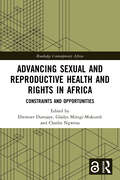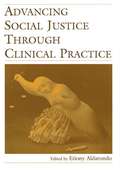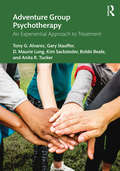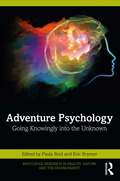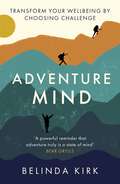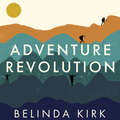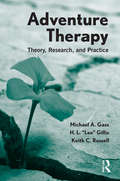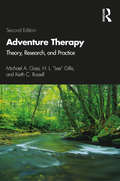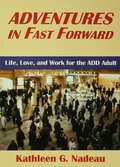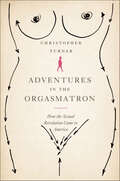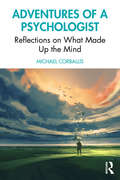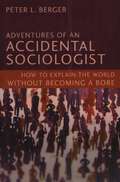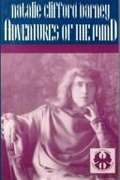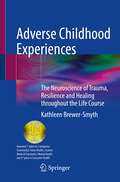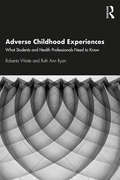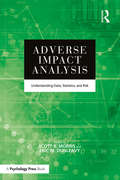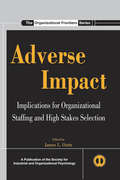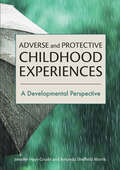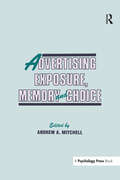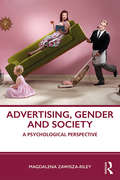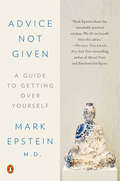- Table View
- List View
Advancing Sexual and Reproductive Health and Rights in Africa: Constraints and Opportunities (Routledge Contemporary Africa)
by Ebenezer Durojaye, Gladys Mirugi-Mukundi and Charles NgwenaThis book explores recent developments, constraints and opportunities relating to the advancement of sexual and reproductive health and rights in Africa. Despite many positive developments in relation to sexual and reproductive health in recent years, many Africans still encounter challenges, for instance in poor maternity services, living with HIV, and discrimination on the basis of age, gender, sexual orientation or identity. Covering topics such as abortion, gender identity, adolescent sexuality and homosexuality, the chapters in this book discuss the impact of culture, morality and social beliefs on the enjoyment of sexual and reproductive health and rights across the continent, particularly in relation to vulnerable and marginalized groups. The book also explores the role of litigation, national human rights institutions and regional human rights bodies in advancing the realization of sexual and reproductive health and rights in the region. Throughout, the contributions highlight the relevance of a rights-based framework in addressing topical and contentious issues on sexual and reproductive health and rights within Sub-Saharan Africa. This book will be of interest to researchers of sexuality, civil rights and health in Africa.
Advancing Social Justice Through Clinical Practice
by Etiony AldarondoThere is a healthy development in the human service professions these days. At community clinics, private practices, and universities around the country mental health professionals and service providers are working with increased awareness of the toxic effects of social inequities in the lives of people they aim to help. Quietly, by acting out thei
Advancing Sports and Exercise via Innovation: Proceedings of the 9th Asian South Pacific Association of Sport Psychology International Congress (ASPASP) 2022, Kuching, Malaysia (Lecture Notes in Bioengineering)
by Tony Morris Rabiu Muazu Musa Anwar P. P. Abdul Majeed Garry Kuan Yu-Kai Chang Teo Eng WahThis book presents the proceedings of the 9th Asian South Pacific Association of Sport Psychology International Congress (ASPASP) 2022, Kuching, Malaysia, which entails the different sporting innovation themes, namely, Applied Sport and Social Psychology, Health and Exercise, Motor Control and Learning, Counselling and Clinical Psychology, Biomechanics, Data Mining and Machine Learning in Sports amongst others. It presents the state-of-the-art technological advancements towards the aforesaid themes and provides a platform to shape the future direction of sport science, specifically in the field sports and exercise psychology.
Adventure Group Psychotherapy: An Experiential Approach to Treatment
by Tony G. Alvarez Gary Stauffer D. Maurie Lung Kim Sacksteder Bobbi Beale Anita R. TuckerAdventure Group Psychotherapy: An Experiential Approach to Treatment explores what is necessary for an experiential therapy group to function effectively, and the practical skills needed to inspire success. The authors describe how to use activities in a manner that produces the greatest opportunity for clients to reach their goals. Issues such as how to actively assess client functioning in the group, how to select the appropriate activity, how to shape an effective environment, and how to help clients process their experience are a few of the aspects examined to help clients move toward their goals. The practical skills the authors describe enable readers to immediately learn and apply their practice with groups. This book will be an important tool in any group therapy class, in practice settings to train practitioners, and for any clinician trying to expand their group work capabilities.
Adventure Psychology: Going Knowingly into the Unknown (Routledge Research in Health, Nature and the Environment)
by Eric Brymer Paula ReidIn recent years a new set of psychological principles has emerged from research investigating adventure and adventurous activities. Adventure involves a special type of physical activity in natural contexts where participants voluntarily participate in experiences where the environment and activity are challenging, perhaps dangerous and potentially life threatening. To go on an adventure is to participate in an enduring event requiring sustainable effort, where effective performance is measured not only by success but also by survival. This book brings together the emerging literature in ‘Adventure Psychology’ that supports enduring performance and wellbeing. The first section examines sustaining performance and wellbeing. The second section studies the transformative aspect of adventure. Adventure Psychology is of use in everyday life and the techniques and understandings can help people and business prepare for the future. This book will help us all thrive despite adversity, volatility and uncertainty. Written for trainers, educators, researchers and students of sports, performance and organisational psychology as well as adventurers and endurance athletes, Adventure Psychology is designed to meet the needs of specialists across a variety of fields but importantly also to be accessible and applicable for those wanting to live life fully — to realise our full potential.
Adventure Revolution: The life-changing power of choosing challenge
by Belinda KirkFor the past twenty-five years, Belinda Kirk's professional life has revolved around adventure. She's seen it change people first hand: turning the timid into the confident, the addicted into the recovering, and the lost into the intentionally wandering. As a force for change, adventure can be powerful like few others.This book is about this transformational power, and the first to explore why adventure is essential to our wellbeing. From managing anxiety and overcoming fear, to finding self-worth and building interpersonal connections, to being happier, healthier, and more playful, ADVENTURE REVOLUTION draws lessons from more than two decades of experience leading groups into the wilderness around the globe. Illuminated with Belinda's personal narrative, her own research with modern hunter-gatherers, and the latest findings in neuroscience and behaviour, ADVENTURE REVOLUTION presents a compelling case for ditching the living room in favour of a longer, happier, and more adventurous life.
Adventure Revolution: The life-changing power of choosing challenge
by Belinda KirkFor the past twenty-five years, Belinda Kirk's professional life has revolved around adventure. She's seen it change people first hand: turning the timid into the confident, the addicted into the recovering, and the lost into the intentionally wandering. As a force for change, adventure can be powerful like few others.This book is about this transformational power, and the first to explore why adventure is essential to our wellbeing. From managing anxiety and overcoming fear, to finding self-worth and building interpersonal connections, to being happier, healthier, and more playful, ADVENTURE REVOLUTION draws lessons from more than two decades of experience leading groups into the wilderness around the globe. Illuminated with Belinda's personal narrative, her own research with modern hunter-gatherers, and the latest findings in neuroscience and behaviour, ADVENTURE REVOLUTION presents a compelling case for ditching the living room in favour of a longer, happier, and more adventurous life.
Adventure Revolution: The life-changing power of choosing challenge
by Belinda KirkFor the past twenty-five years, Belinda Kirk's professional life has revolved around adventure. She's seen it change people first hand: turning the timid into the confident, the addicted into the recovering, and the lost into the intentionally wandering. As a force for change, adventure can be powerful like few others.This book is about this transformational power, and the first to explore why adventure is essential to our wellbeing. From managing anxiety and overcoming fear, to finding self-worth and building interpersonal connections, to being happier, healthier, and more playful, ADVENTURE REVOLUTION draws lessons from more than two decades of experience leading groups into the wilderness around the globe. Illuminated with Belinda's personal narrative, her own research with modern hunter-gatherers, and the latest findings in neuroscience and behaviour, ADVENTURE REVOLUTION presents a compelling case for ditching the living room in favour of a longer, happier, and more adventurous life.
Adventure Therapy: Theory, Research, and Practice
by Michael A. Gass H.L. "Lee" Gillis Keith C. Russell<p>The evolution and history of adventure therapy, as chronicled in the second chapter of this book, well demonstrates how far this field has evolved from a “divergent therapy” into an efficacious form of therapy that engages clients on cognitive, affective, and behavioral levels. Adventure Therapy is written by three professionals who have been at the forefront of the field since its infancy. The theory, techniques, research, and case studies they present are the cutting edge of this field. <p>The authors focus on: <li> the theory substantiating adventure therapy <li> illustrations that exemplify best practices <li> the research validating the immediate as well as long-term effects of adventure therapy, when properly conducted.</li> <p> <p>This book is the leading academic text, professional reference, and training resource for adventure therapy practices in the field of mental health. It is appropriate for a wide range of audiences, including beginner and experienced therapists, as well as graduate students.
Adventure Therapy: Theory, Research, and Practice
by Michael A. Gass Keith C. Russell H.L. "Lee" GillisThis revised text describes the theory substantiating adventure therapy, demonstrates best practices in the field, and presents research validating the immediate and long-term effects of adventure therapy. A leading text in the field of adventure therapy, outdoor behavioral healthcare, and wilderness therapy, the book is written by three professionals who have been at the forefront of the field since its infancy. This new edition includes fully updated chapters to reflect the immense changes in the field since the first edition was written in 2010. It serves to provide information detailing what is occurring with clients as well as how it occurs. This book provides an invaluable reference for the seasoned professional and is a required source of information and examination for the beginning professional. It is a great training resource for adventure therapy practices in the field of mental health.
Adventures In Fast Forward: Life, Love and Work for the Add Adult
by Kathleen G. NadeauWritten in response to common questions posed by adults with ADD in the author's clinical practice - and for all adults with ADD, as well as those who care about them - this book is designed as a clear and practical guide for day-to-day life. The author's perspective is one of compassionate realism as she answers specific questions related to understanding and accommodating ADD whether making daily decisions or larger life choices.
Adventures in the Orgasmatron: How the Sexual Revolution Came to America
by Christopher TurnerOne of The Economist's 2011 Books of the Year A Boston Globe Best Nonfiction Book of 2011 Well before the 1960s, a sexual revolution was under way in America, led by expatriated European thinkers who saw a vast country ripe for liberation. In Adventures in the Orgasmatron, Christopher Turner tells the revolution's story—an illuminating, thrilling, often bizarre story of sex and science, ecstasy and repression. Central to the narrative is the orgone box—a tall, slender construction of wood, metal, and steel wool. A person who sat in the box, it was thought, could elevate his or her "orgastic potential." The box was the invention of Wilhelm Reich, an outrider psychoanalyst who faced a federal ban on the orgone box, an FBI investigation, a fraught encounter with Einstein, and bouts of paranoia. In Turner's vivid account, Reich's efforts anticipated those of Alfred Kinsey, Herbert Marcuse, and other prominent thinkers—efforts that brought about a transformation of Western views of sexuality in ways even the thinkers themselves could not have imagined.
Adventures of a Psychologist: Reflections on What Made Up the Mind
by Michael CorballisIn this enlightening biography, award- winning academic psychologist Michael Corballis tells the story of how the field of cognitive psychology evolved and the controversies and anecdotes that occurred along the way. Since the Second World War, psychology has undergone several scientific movements, from behaviourism to cognitive psychology and finally to neuroscience. In this fascinating biography, Corballis recounts his career as a researcher who played a part in these monumental changes in psychology. Beginning with his boarding-school education in New Zealand, Corballis goes on to recount his PhD studies and behavioural research into mirror-image discriminations in pigeons, the uprising of the "cognitive revolution" amidst 1960s counterculture and his switch to become a cognitive psychologist, his research into brain asymmetry and the evolution of language and its origin of manual gestures, and the development of mental time travel in animals. Featuring stories of prominent scientists who were integral in psychology’s biggest discoveries and insight into the heated debates and controversies in psychology during a time of great scientific and sociocultural change, this biography is a must-read for those interested in how psychology became established as a science.
Adventures of an Accidental Sociologist: How to Explain the World Without Becoming a Bore
by Peter L. BergerPeter L. Berger is arguably the best-known American sociologist living today. Since the 1960s he has been publishing books on many facets of the American social scene, and several are now considered classics. So it may be hard to believe Professor Berger's description of himself as an "accidental sociologist." But that in fact accurately describes how he stumbled into sociology. In this witty, intellectually stimulating memoir, Berger explains not only how he became a social scientist, but the many adventures that this calling has led to. Rather than writing an autobiography, he focuses on the main intellectual issues that motivated his work and the various people and situations he encountered in the course of his career. Full of memorable vignettes and colorful characters depicted in a lively narrative often laced with humor, Berger's memoir conveys the excitement that a study of social life can bring. The first part of the book describes Berger's initiation into sociology through the New School for Social Research, "a European enclave in the midst of Greenwich Village bohemia." Berger was first a student at the New School and later a young professor amidst a clique of like-minded individuals. There he published The Social Construction of Reality (with colleague Thomas Luckmann), one of his most successful books, followed by The Sacred Canopy on the sociology of religion, also still widely cited. The book covers Berger's experience as a "globe-trekking sociologist" including trips to Mexico, where he studied approaches to Third World poverty; to East Asia, where he discovered the potential of capitalism to improve social conditions; and to South Africa, where he chaired an international study group on the future of post-Apartheid society. Berger then tells about his role as the director of a research center at Boston University. For over two decades he and his colleagues have been tackling such important issues as globalization, the secularization of Europe, and the ongoing dialectic between relativism and fundamentalism in contemporary culture. What comes across throughout is Berger's boundless curiosity with the many ways in which people interact in society. This book offers longtime Berger readers as well as newcomers to sociology proof that the sociologist's attempt to explain the world is anything but boring.
Adventures of the Mind: The Memoirs of Natalie Clifford Barney
by Natalie C. Barney John S. GattonBarney explores her family tree, chronicles her friendships and associations through reprinted correspondence and recreated conversations, and evokes the golden age of her salon in gallery of literary portraits.
Adverse Childhood Experiences: The Neuroscience of Trauma, Resilience and Healing throughout the Life Course
by Kathleen Brewer-SmythThe entire world is in crisis with adverse childhood experiences (ACEs) and other lifetime trauma at an all-time high. This book is a valuable resource to promote optimal brain function for everyone, but especially for survivors of trauma who are particularly at risk throughout the life course. It is critical for healthcare providers, schoolteachers and administration, public safety professionals, foster and adoptive parents, employers and loved ones to understand the potential life-long consequences that ACEs can have in the lives of survivors. This book describes the complexities behind why behaviors occur if hurt people hurt themselves and others. The first half of this book addresses what can go wrong in the brain and body after trauma that potentially leads to life-long poor bio-behavioral health outcomes. The second half of this book addresses how the life-long poor bio-behavioral health outcomes can be prevented, mitigated or potentially reversed. This book is necessary for everyone who is interested in optimizing brain function, especially survivors of ACEs and other trauma throughout the life course who are at greater risk. The major focus of the book is on how to prevent long-term negative consequences of trauma and how to restore the brain, body, behavior and emotions.
Adverse Childhood Experiences: What Students and Health Professionals Need to Know
by Roberta Waite Ruth Ann RyanThis guide provides healthcare students and professionals with a foundational background on adverse childhood experiences (ACEs) – traumatic early life experiences, which can have a profound impact on health in later life. ACEs can include being a victim of abuse, neglect or exposure to risk in the home or community. How healthcare students and professionals learn to recognize, react and respond to persons affected by trauma will lay the foundation for their relationships with patients. This book intentionally uses micro-to-macro lenses accompanied by a structural competency framework to elucidate health implications across the lifespan. It explores the nature of adversity and its effects on the physical, emotional, cognitive and social health of individuals, communities and society. The book, written by two experienced psychiatric nurses, will equip healthcare students and professionals with an understanding for critical change in practice and offer action steps designed to assist them with prevention and intervention approaches and steps to help build resilience. This book will be core reading for healthcare students within mental health, pediatric and primary care nursing courses. It will also be of interest to students and professionals in the social work, psychology and public health fields who are exploring resilience and trauma-informed practices
Adverse Impact Analysis: Understanding Data, Statistics, and Risk
by Scott B. Morris Eric M. DunleavyCompliance with federal equal employment opportunity regulations, including civil rights laws and affirmative action requirements, requires collection and analysis of data on disparities in employment outcomes, often referred to as adverse impact. While most human resources (HR) practitioners are familiar with basic adverse impact analysis, the courts and regulatory agencies are increasingly relying on more sophisticated methods to assess disparities. Employment data are often complicated, and can include a broad array of employment actions (e.g., selection, pay, promotion, termination), as well as data that span multiple protected groups, settings, and points in time. In the era of "big data," the HR analyst often has access to larger and more complex data sets relevant to employment disparities. Consequently, an informed HR practitioner needs a richer understanding of the issues and methods for conducting disparity analyses. This book brings together the diverse literature on disparity analysis, spanning work from statistics, industrial/organizational psychology, human resource management, labor economics, and law, to provide a comprehensive and integrated summary of current best practices in the field. Throughout, the description of methods is grounded in the legal context and current trends in employment litigation and the practices of federal regulatory agencies. The book provides guidance on all phases of disparity analysis, including: How to structure diverse and complex employment data for disparity analysis How to conduct both basic and advanced statistical analyses on employment outcomes related to employee selection, promotion, compensation, termination, and other employment outcomes How to interpret results in terms of both practical and statistical significance Common practical challenges and pitfalls in disparity analysis and strategies to deal with these issues
Adverse Impact Analysis: Understanding Data, Statistics, and Risk
by Scott B. Morris Eric M. DunleavyCompliance with federal equal employment opportunity regulations, including civil rights laws and affirmative action requirements, requires collection and analysis of data on disparities in employment outcomes, often referred to as adverse impact. While most human resources (HR) practitioners are familiar with basic adverse impact analysis, the courts and regulatory agencies are increasingly relying on more sophisticated methods to assess disparities. Employment data are often complicated, and can include a broad array of employment actions (e.g., selection, pay, promotion, termination), as well as data that span multiple protected groups, settings, and points in time. In the era of "big data," the HR analyst often has access to larger and more complex data sets relevant to employment disparities. Consequently, an informed HR practitioner needs a richer understanding of the issues and methods for conducting disparity analyses.This book brings together the diverse literature on disparity analysis, spanning work from statistics, industrial/organizational psychology, human resource management, labor economics, and law, to provide a comprehensive and integrated summary of current best practices in the field. Throughout, the description of methods is grounded in the legal context and current trends in employment litigation and the practices of federal regulatory agencies. The book provides guidance on all phases of disparity analysis, including: How to structure diverse and complex employment data for disparity analysis How to conduct both basic and advanced statistical analyses on employment outcomes related to employee selection, promotion, compensation, termination, and other employment outcomes How to interpret results in terms of both practical and statistical significance Common practical challenges and pitfalls in disparity analysis and strategies to deal with these issues
Adverse Impact: Implications for Organizational Staffing and High Stakes Selection (SIOP Organizational Frontiers Series)
by James L. OuttzThis text is the best single repository for a comprehensive examination of the scientific research and practical issues associated with adverse impact. Adverse impact occurs when there is a significant difference in organizational outcomes to the disadvantage of one or more groups defined on the basis of demographic characteristics such as race, ethnicity, gender, age, religion, etc. This book shows, based on scientific research, how to design selection systems that minimize subgroup differences. The primary object of this volume in the SIOP series is to bring together renowned experts in this field to present their viewpoints and perspectives on what underlies adverse impact, where we are in terms of assessing it and what we may have learned (or not learned) about minimizing it.
Adverse and Protective Childhood Experiences: A Developmental Perspective
by Jennifer Hays-Grudo Amanda Sheffield Morris PhDAdverse childhood experiences (ACEs) can negatively influence development. However, the lifelong effects of positive childhood experiences (PACEs) can mitigate the detrimental effects of adverse ones. By integrating existing knowledge about (ACEs) with developmental research on preventing, buffering, and treating the effects of adversity, stress, and trauma on child development and subsequent health and functioning, this book identifies the most important of these (PACEs). It provides an interdisciplinary lens from which to view the multiple types of effects of enduring childhood experiences, and recommends evidence-based approaches for protecting children and repairing the enduring negative consequences of (ACEs) they face as adults. Students, researchers, clinicians, and health-care providers can use this research to understand the science of early life adversity, lifelong resilience, and related intervention and prevention programming to help those suffering from the lifelong effects of (ACEs). Chapters include many figures, graphs, diagrams, stories, and activities that aim to help readers apply the science to everyday life.
Advertising Exposure, Memory and Choice
by Andrew A. MitchellTheoretical research on advertising effects at the individual level has focused almost entirely on the effects of advertising exposure on attitudes and the mediators of attitude formation and change. This focus implicitly assumes attitudes are a good predictor of behavior, which they generally are not, and downplays the role of memory, in that, there is generally a considerable amount of time between advertising exposure and purchase decisions in most marketing situations. Recently, a number of researchers have developed conceptual models which provide an explicit link between two separate events -- advertising exposure and purchase behavior -- with memory providing the link between these events. Originally presented at the eighth annual Advertising and Consumer Psychology Conference held in Toronto, some chapters in this volume present recent research on the role of inferences in advertising situations, the effects of exposure to multiple advertisements, message receptivity, drama advertisements and the use of EEG in measuring advertising effectiveness. Contributions focus on research examining the effects of advertising exposure on consumer information processing and decision making. This book will be of interest to consumer psychologists and professionals in advertising and marketing.
Advertising and the World Wide Web
by Esther Thorson David W. SchumannThe chapters provide a wide-ranging view of issues addressing how advertisers can proceed on the Internet and World Wide Web. An initial chapter traces the development of Web advertising from its very beginnings as it was represented and discussed in the pages of Advertising Age. Although there is a noticeable trend to define Web advertising by comparing it to traditional media, it is clear that Web advertising just won't fit the old mold. Keith Reinhard of DDB Needham actually articulates this linkage between the old and new in his invited chapter. What the reader will encounter in Advertising and the World Wide Web is a solid conception of how Web advertising is different from anything that has come before. There are numerous discussions on consumer and advertiser interactivity, the role of Web advertising within larger campaigns, audience segmentation, and alternative Web-based promotion formats. The five sections cover definition and theory, structure, specific applications, legal issues, and the voice of the practitioner. Although there remain a few nay-sayers concerning the future of Web advertising, the reader will be able to see just how incredibly high-impact this new medium has become and the vast potential that it holds for future promotional endeavors.
Advertising, Gender and Society: A Psychological Perspective
by Magdalena Zawisza-RileyAdvertising, Gender and Society explores contemporary social-psychological theory and original research that examines the portrayal of gender in advertising. It reports empirical data, discusses the social implications of gendered advertising and comments on the relevant 2019 ASA rules. Zawisza-Riley analyses theories such as stereotype content and elaboration likelihood models, stereotype threat and ambivalent sexism theories, the selectivity hypothesis as well as implicit and embodied cognition to illuminate the relationships between sex, gender and advertising in cultural and social contexts. The author thus examines the portrayal of gender in advertising, its effectiveness and effect on audiences and the ways in which audiences, marketers and policy-makers can mitigate potential harm of gendered advertising. She offers theory extension and novel application of existing theory and research to the subject of gender advertising. Advertising, Gender and Society is ideal for students, academics and professionals in the fields of psychology, gender and media studies as well as marketing, advertising and policy-making.
Advice Not Given: A Guide to Getting Over Yourself
by Mark EpsteinOur ego, and its accompanying sense of nagging self-doubt as we work to be bigger, better, smarter, and more in control, is one affliction we all share. And while our ego claims to have our best interests at heart, in its never-ending pursuit of attention and power, it sabotages the very goals it sets to achieve. In Advice Not Given, renowned psychiatrist and author Dr. Mark Epstein reveals how Buddhism and Western psychotherapy, two traditions that developed in entirely different times and places and, until recently, had nothing to do with each other, both identify the ego as the limiting factor in our well-being, and both come to the same conclusion: When we give the ego free reign, we suffer; but when it learns to let go, we are free. With great insight, and in a deeply personal style, Epstein offers readers a how-to guide that refuses a quick fix, grounded in two traditions devoted to maximizing the human potential for living a better life. Using the Eightfold Path, eight areas of self-reflection that Buddhists believe necessary for enlightenment, as his scaffolding, Epstein looks back productively on his own experience and that of his patients. While the ideas of the Eightfold Path are as old as Buddhism itself, when informed by the sensibility of Western psychotherapy, they become something more: a road map for spiritual and psychological growth, a way of dealing with the intractable problem of the ego. Breaking down the wall between East and West, Epstein brings a Buddhist sensibility to therapy and a therapist's practicality to Buddhism. Speaking clearly and directly, he offers a rethinking of mindfulness that encourages people to be more watchful of their ego, an idea with a strong foothold in Buddhism but now for the first time applied in the context of psychotherapy. Our ego is at once our biggest obstacle and our greatest hope. We can be at its mercy or we can learn to mold it. Completely unique and practical, Epstein's advice can be used by all--each in his or her own way--and will provide wise counsel in a confusing world. After all, as he says, "Our egos can use all the help they can get. "
